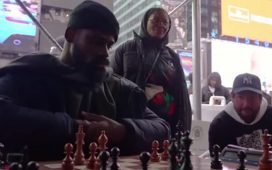
Socialite and reality TV star Paris Hilton leads a protest against her former school, which she … [+]
It’s the punishment that has been condemned as a brutal violation of prisoners’ rights – unethical as well as ineffective – but that hasn’t stopped its use in schools.
Solitary confinement remains controversial in prisons, prompting campaigns for its abolition with a United Nations special rapporteur arguing that it amounts to a form of torture and should be banned.
But it is still practised in schools, where students face being locked in rooms alone as punishment for misbehavior.
And it is one of the practises singled out as ‘traumatizing’ by Paris Hilton in a protest at one of her former schools earlier this month.
The socialite and reality TV star claims the punishments inflicted at Provo Canyon School in Utah – including locking students into isolation rooms – amounted to torture, allegations she first aired in the YouTube documentary This is Paris.
Provo Canyon, a residential school for troubled students, is now under new ownership, and in a statement on its website said while it could not comment on operations prior to 2000, it was ‘committed to providing high quality care’.
Award-winning filmmaker Cevin Soling is one of those campaigning against the use of solitary confinement in schools.
Around 33,000 students are subject to seclusion each year, 0.1% of the total student population, with students with disabilities and students of color disproportionately more likely to be secluded, according to a U.S. Government Accounting Office report last year.
But even these figures are likely to be an underestimate, and the use of seclusion often goes unreported, according to campaigners.

Filmmaker Cevin Soling is a critic of the use of solitary confinement in schools
Soling, whose 2009 documentary on the U.S. schooling system The War on Kids argued that a zero tolerance approach to student behavior has led to schools becoming increasingly authoritarian, highlights a number of cases where solitary confinement has had horrific consequences.
Among these is Jonathan King, a 13-year-old who hanged himself after being locked in a room at a special education school in Georgia, and Carson Luke, a second grader who broke his hand and foot on the door after being shut in the ‘quiet room’ at his school in Virginia.
‘[Solitary confinement] is widely considered as torture, it is being phased out of federal prisons, and yet it is used in public schools,’ says Soling.
“Whatever rights children have, it seems they are diminished when you are in school. There is a sense that children need to be subjected to brutal tactics so they turn out better. There is a sense that brutality when it comes to children is acceptable.’
Soling’s views were shaped by his own education. Although he says he never had discipline problems personally, he found the experience of being subject to petty rules degrading.
This, combined with the knowledge gained studying for a degree in education from Harvard, has given him ‘an obligation’ to speak out, he says.
He says parents frequently do not know their child has been put in solitary confinement, and it is only weeks later that they find out the truth.
Jonathan King told his mother he had been put in ‘time out’, which she thought meant he had to sit in the corner, little thinking it meant he had been locked in a concrete room which had its window obscured with a piece of paper.
Arne Duncan, Education Secretary under President Obama, wrote that ‘there continues to be no evidence that using restraint or seclusion is effective in reducing the occurrence of the problem behaviors that frequently precipitate the use of such techniques,’ in a 2012 Department for Education report.
The same report argued that ‘seclusion should not be used except in situations where the child’s behavior poses imminent danger of serious physical harm to self or others’ and that it ‘should be avoided to the greatest extent possible without endangering the safety of students and staff’.
But seclusion is still widely practised, a fact Soling puts at least partly down to the popularity of the zero tolerance approach to student behavior, which sees students face punitive sanctions for relatively minor misdemeanors.
‘There are all sorts of consequences of being placed in seclusion and it can lead to all sorts of physical and psychological issues,’ he says.






